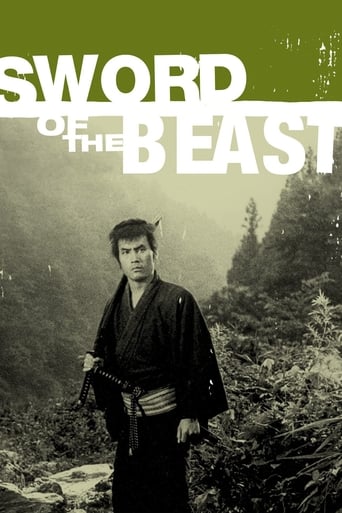mmushrm
I found this movie to be very enjoyable with great pacing. Watching this movie, I was enthralled by the artistry involved in good black and white cinematography. The play of the lighting and shadows and the acting involved in this movie is good. For those of you who remember those old sci-fi horror TV shows where the narrator always comes on in the end and makes a closing statement/comment on the preceding episode. In the case of this movie it would've been ".....and the beast was man.". The plot breakdown has already been written in the other reviews so i will not repeat. However I feel that the "message" of the story is interesting enough that different people will come away with different understanding and feelings. For me its a commentary on how honour, duty, patriotism, ambition can and will be manipulated and used by those in authority to control the actions of the masses (for the authorities on benefit).
gypzzy
The plot of this film with all its brilliantly weaved in subplots, is as fresh as it was on release simply for its varied human emotions involved.It is brilliantly constructed plot for its masterful simplicity and coherence.I beg to differ with the previous review that the plot is complicated.It has been masterfully shot by Toshitada Tsuchiya.Though not as exclusively done in Hara Kiri, the issue of the insurmountable Samurai-pride is touched upon and exposed for its obvious conflict with human values and frailties.The universal theme of power-centers exploiting desperate individuals for its ends and expending with them once the latter serve out the former's purpose is explored in this film.The theme of the ever-resillient individuals faced with debilitating order and the need to escape the same to be free and alive is the principal theme of this film. Even in its length the film is just one and a half hours.It is so good one would wish it were longer!! This film is highly recommended for anyone interested in films, along with Samurai-drama fans and those who appreciate good cinematography. Definitely a classic.
lastliberal
It is interesting that the supposed "beast" in this film is the one who acts with the most honor among all the samurai involved.It is a short film that has many stories going on.Gennosuke (Mikijiro Hira) has been betrayed by the vice-Chancellor after he kills the Chancellor of the clan and is on the run, a "beast" forced to live in the forest. He befriends a gold digger, who really has an excellent part with laughs and thoughtful lines.He also comes across another samurai who has been living in the forest with his wife collecting gold for his clan and hoping for advancement. He, too, will be betrayed, and by the same person as betrayed Gennosuke.As everything gets sorted out, there is some good swordplay, and, like the western hero we are all familiar with, Gennosuke walks off into the sunset.Definitely makes me want to check out more of Hideo Gosha.
jprince11
On the surface this may seem like a typical samurai action flick but like Kurosawa and Kobyashi films there are many social implications beneath the surface.The movie seems to revolve around the irony that while Gennosuke, the main character who is basically cast out of society in to the wild and forced to constantly fight for his survival like an animal, is actually the only character that tries to show any qualities above that of a beast.Every other character from a group of bandits he encounters to the group of clansmen trying to exact revenge after Gennosuke killed their leader, to a man and his wife from a separate clan trying to steal gold to improve their clan status are either acting for revenge, power, or greed. The greed exists because most of the movie takes place around a mountain where gold has just been discovered and Gennosuke is befriended by a poor man hoping to find some for himself.Throughout the movie there is constant backstabbing, deception, and generally brutal acts committed by a multitude of these characters. For instance the man from a separate clan living with his wife on a shack by the river are attacked by bandits in the woods trying to steal the gold they have already mined; they hold the wife hostage in demand for his booty but the man would rather give up his wife then part with his gold. Her saving grace is when Gennosuke shows up on the the scene and acts with the courage and compassion to save her life. The husband does come around a little later in the movie but in the end his rival clan plans to kill everyone on the mountain and save the gold for themselves threatening the couple, Gennosuke, and his persuers.Gosha does a great job with his imagery, demonstrating a wild, dark world threatening to swallow humans whole. Throughout the film, which is almost all outdoors are scenes of men disappearing into woods or buried beneath shrubbery. In fact, it's quite reminiscent of another Japanese Classic, Rashamon. Some of the shots are virtually identical, ie the sun being concealed over the forest canopy or disappearing behind a mountain.One of the best touches is towards the end when soldiers from the rival clan are planning to take the mountain, and kill anyone who knows about the gold. One of them sounds a battle horn to signal the approach, a battle horn made to sound conspicuously like some kind of strange animal call.


